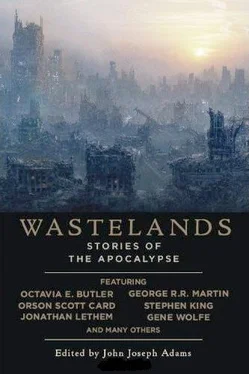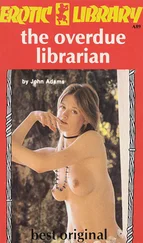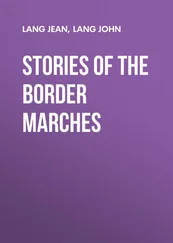I turned on the radio, dialled through four bands, found one crazy guy, and shut it off. I sat there thinking of ways to tell this story. My mind kept sliding away toward all those miles of dark pinewoods, all that nothing. Finally I realized I needed to get myself off the dime and shoot myself up. Shit. I never could work without a deadline.
And I’ve sure-to-God got one now.
Our parents had no reason to expect anything other than what they got: bright children. Dad was a history major who had become a full professor at Hofstra when he was thirty. Ten years later he was one of six vice-administrators of the National Archives in Washington, D.C., and in line for the top spot. He was a helluva good guy, too—had every record Chuck Berry ever cut and played a pretty mean blues guitar himself. My dad filed by day and rocked by night.
Mom graduated magna cum laude from Drew. Got a Phi Beta Kappa key she sometimes wore on this funky fedora she had. She became a successful CPA in D.C., met my dad, married him, and took in her shingle when she became pregnant with yours truly. I came along in 1980. By ’84 she was doing taxes for some of my dad’s associates—she called this her "little hobby." By the time Bobby was born in 1987, she was handling taxes, investment portfolios, and estate-planning for a dozen powerful men. I could name them, but who gives a wad? They’re either dead or drivelling idiots by now.
I think she probably made more out of "her little hobby" each year than my dad made at his job, but that never mattered—they were happy with what they were to themselves and to each other. I saw them squabble lots of times, but I never saw them fight. When I was growing up, the only difference I saw between my mom and my playmates’ moms was that their moms used to read or iron or sew or talk on the phone while the soaps played on the tube, and my mom used to run a pocket calculator and write down numbers on big green sheets of paper while the soaps played on the tube.
I was no disappointment to a couple of people with Mensa Gold Cards in their wallets. I maintained A’s and B’s through my public-school career (the idea that either I or my brother might go to a private school was never even discussed so far as I know). I also wrote well early, with no effort at all. I sold my first magazine piece when I was twenty—it was on how the Continental Army wintered at Valley Forge. I sold it to an airline magazine for four hundred fifty dollars. My dad, whom I loved deeply, asked me if he could buy that check from me. He gave me his own personal check and had the check from the airline magazine framed and hung it over his desk. A romantic genius, if you will. A romantic blues playing genius, if you will. Take it from me, a kid could do a lot worse. Of course he and my mother both died raving and pissing in their pants late last year, like almost everyone else on this big round world of ours, but I never stopped loving either of them.
I was the sort of child they had every reason to expect—a good boy with a bright mind, a talented boy whose talent grew to early maturity in an atmosphere of love and confidence, a faithful boy who loved and respected his mom and dad.
Bobby was different. Nobody , not even Mensa types like our folks, ever expects a kid like Bobby. Not ever .
I potty-trained two full years earlier than Bob, and that was the only thing in which I ever beat him. But I never felt jealous of him; that would have been like a fairly good American Legion League pitcher feeling jealous of Nolan Ryan or Roger Clemens. After a certain point the comparisons that cause feelings of jealousy simply cease to exist. I’ve been there, and I can tell you: after a certain point you just stand back and shield your eyes from the flash burns.
Bobby read at two and began writing short essays ("Our Dog," "A Trip to Boston with Mother") at three. His printing was the straggling, struggling galvanic constructions of a six-year-old, and that was startling enough in itself, but there was more: if transcribed so that his still-developing motor control no longer became an evaluative factor, you would have thought you were reading the work of a bright, if extremely naive, fifth-grader. He progressed from simple sentences to compound sentences to complex ones with dizzying rapidity, grasping clauses, sub-clauses, and modifying clauses with an intuitiveness that was eerie. Sometimes his syntax was garbled and his modifiers misplaced, but he had such flaws-which plague most writers all their lives pretty well under control by the age of five.
He developed headaches. My parents were afraid he had some sort of physical problem-a brain-tumour, perhaps-and took him to a doctor who examined him carefully, listened to him even more carefully, and then told my parents there was nothing wrong with Bobby except stress: he was in a state of extreme frustration because his writing-hand would not work as well as his brain.
"You got a kid trying to pass a mental kidney stone," the doctor said. "I could prescribe something for his headaches, but I think the drug he really needs is a typewriter." So Mom and Dad gave Bobby an IBM. A year later they gave him a Commodore 64 with WordStar for Christmas and Bobby’s headaches stopped. Before going on to other matters, I only want to add that he believed for the next three years or so that it was Santa Claus who had left that word-cruncher under our tree. Now that I think of it, that was another place where I beat Bobby: I Santa-trained earlier, too.
There’s so much I could tell you about those early days, and I suppose I’ll have to tell you a little, but I’ll have to go fast and make it brief. The deadline. Ah, the deadline. I once read a very funny piece called "The Essential Gone with the Wind" that went something like this:
“‘A war?’ laughed Scarlett. ‘Oh, fiddle-de-dee!’
“Boom! Ashley went to war! Atlanta burned! Rhett walked in and then walked out!
"‘Fiddle-de-dee,’ said Scarlett through her tears, ‘I will think about it tomorrow, for tomorrow is another day.’"
I laughed heartily over that when I read it; now that I’m faced with doing something similar, it doesn’t seem quite so funny. But here goes:
"A child with an IQ immeasurable by any existing test?" smiled India Fornoy to her devoted husband, Richard. Fiddle-de-dee! Well provide an atmosphere where his intellect-not to mention that of his not-exactly-stupid older brother-can grow. And we’ll raise them as the normal all-American boys they by gosh are!"
Boom! The Fornoy boys grew up! Howard went to the University of Virginia, graduated cum laude, and settled down to a freelance writing career! Made a comfortable living! Stepped out with a lot of women and went to bed with quite a few of them! Managed to avoid social diseases both sexual and pharmacological! Bought a Mitsubishi stereo system! Wrote home at least once a week! Published two novels that did pretty well! "Fiddle-de-dee" said Howard, "this is the life for me!"
And so it was, at least until the day Bobby showed up unexpectedly (in the best mad-scientist tradition) with his two glass boxes, a bees’ nest in one and a wasps’ nest in the other, Bobby wearing a Mumford Phys Ed tee-shirt inside-out, on the verge of destroying human intellect and just as happy as a clam at high tide.
Guys like my brother Bobby come along only once every two or three generations, I think—guys like Leonardo da Vinci, Newton, Einstein, maybe Edison. They all seem to have one thing in common: they are like huge compasses which swing aimlessly for a long time, searching for some true north and then homing on it with fearful force. Before that happens such guys are apt to get up to some weird shit, and Bobby was no exception.
Читать дальше












